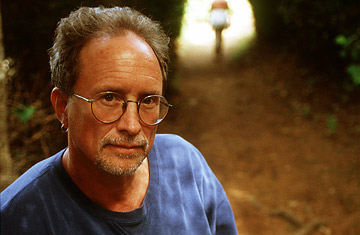
Author and teacher Bill Ayers poses along a path in a California coastal park
In recent months, Chicago has bathed in pride as the place Barack Obama calls home, in spite of the attendant scrutiny on people like the Rev. Jeremiah Wright Jr. and Tony Rezko. But it is now particularly defensive, if not irate, about the latest local figure to haunt Obama's presidential candidacy: Bill Ayers.
Ayers, 63, is the University of Illinois at Chicago education professor who, during the Vietnam era, was a leader of radical group the Weather Underground. In recent weeks, Republicans have mounted an increasingly potent assault on Obama's past dealings with Ayers. Sarah Palin, the GOP vice-presidential candidate, depicted Chicago as a hotbed of radical politics. Earlier this month, she referred to Ayers when she said Obama "sees America as imperfect enough to pal around with terrorists who targeted their own country." During Wednesday night's final presidential debate, Senator John McCain, the Republican presidential nominee, continued to question Obama's association with Ayers, insisting that the Democratic nominee launched his political career in Ayers' living room. Obama very audibly interjected that such criticism was a falsehood.
For a sense of the reaction in Chicago, consider the headline of a recent Chicago Tribune blog post: "Question for Ayers alarmists: Where were you in the 1990s?" That was the period in which Ayers evolved from a bomb-throwing radical into a socially acceptable pioneer in education. At the university in recent days, Ayers' colleagues have circulated letters expressing support. Similar formal statements may soon come from a group of alumni and the university itself. "Bill has nothing to be ashamed about in his scholarly career — it's one that any scholar can take pride in," says Victoria Chou, dean of the College of Education at the University of Illinois here, and a friend of Ayers for years. She adds, "I'm just disappointed in those in our country who would try to tear down and destroy his reputation for political purposes. This is about Obama, not really about Bill, but it's troubling us all."
Ayers' Illinois roots run deep. His father was a top executive at Commonwealth Edison, a local utility company. The young Ayers, inspired by the 1960s civil rights movement, later emerged as a leader of the Weather Underground, a group that bombed the U.S. Capitol and the Pentagon. He and other members of the group soon fled into seclusion, taking on assumed names. He and his wife, fellow radical Bernardine Dohrn, turned themselves in after charges were dropped because of tainted evidence. (Ayers' famous quote afterward: "Guilty as hell, and free as a bird. It's a great country.") By the mid-1980s, Ayers had re-emerged as an education scholar and was on track toward tenured status at the University of Illinois. In the early 1990s, Chicago's mayor, Richard M. Daley, named him an assistant deputy mayor for education, and by the decade's end, he'd been named the city's Citizen of the Year.
He became an influential fixture in Chicago society. In 1995, Ayers and his wife hosted a coffee at their home in the leafy intellectual enclave here known as Hyde Park. The Obama campaign has stopped commenting on it. Based on other reports, the gathering may have been a campaign event for Alice Palmer, the Illinois state senator who was one of Obama's mentors and, at the time, was plotting a bid for Congress. It may also have been one of several coffees organized at the time to allow Obama to be introduced as Palmer's heir apparent. Or both. (Palmer and Obama had a falling-out soon after; she supported Hillary Clinton during the Democratic primaries.) It's clear that during the coffee, Obama, then a young University of Chicago law professor, met an influential group of Chicagoans who would be crucial for his eventual bid for Palmer's Illinois senate seat. (Obama would formally launch that bid on Sept. 19, 1995 at the Hyde Park Ramada.) For a time, Ayers and Obama served on the board of the Woods Fund, a nonpartisan charitable group. They also worked together on the Chicago Annenberg Challenge, which was supported by funds of an organization set up by Walter Annenberg, the late publisher whose widow is a supporter of John McCain.
